All Mouawad boutiques are now open.
Please view our Covid-19 measures below.
VIEW HERE
Diamond Education from Mouawad

Diamond engagement ring shopping should be a joyous occasion. Our tips will help you make sure she loves her ring.
It should be one of the most memorable moments in your life. You pull an engagement ring out of your pocket and ask the love of your life to be your wife. You desperately want her to say yes and fall in love with her ring too, right?
You can make sure that happens if you follow these tips to pick out the perfect engagement ring:
DECIDE HOW MUCH YOU WANT TO SPEND
You will be confronted with a dizzying array of choices when it comes to engagement rings. Have a price range in mind before you start to shop. Going in with fairly specific parameters will help your jeweler find the right engagement ring to fit your budget.
DO YOUR HOMEWORK
There’s a lot you can learn about diamonds before you even set foot in a jewelry store. Start with the 4Cs – Color, Clarity, Cut and Carat Weight – so you understand how each influences the value of the diamond and adds to the overall appearance of the stone. You’ll learn what is most important to you and where you might want to compromise to fit your price range.
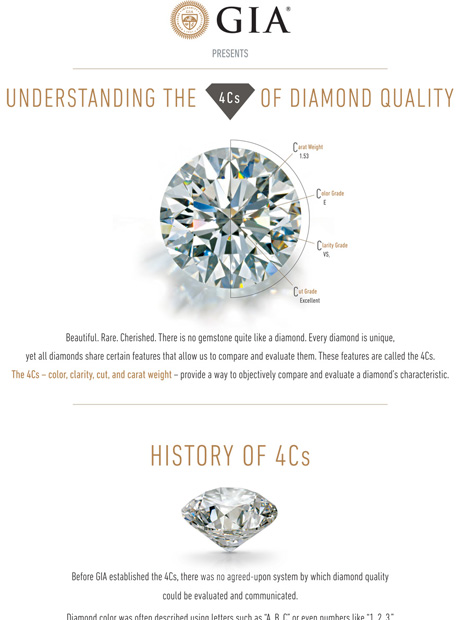
UNDERSTAND HER TASTE IN JEWELRY
Pay attention to the kind of jewelry she already wears. Is she more classic or modern? Does she wear more white metals or yellow gold? Do her pieces tend to be more delicate or chunky? Sleek or ornate? Have these preferences in mind when you set out to shop. If you buy something similar to what she already likes, you can't go wrong.
KNOW HER RING SIZE
If she wears rings, borrow one she already owns. Trace the inner circle on a piece of paper, or press the ring into a bar of soap for an impression. You can also slide it down one of your own fingers and draw a line where it stops. A jeweler can use these measurements to identify her approximate ring size.
If she doesn't wear rings, estimate in the following manner: The average ring size in the U.S. is 6 (based on the 'average' U.S. female being 5'4" tall and weighing 140 lbs.) If she's more slender, or fine-boned, her ring size is probably in the 4 1/2 to 5 1/2 range. If she is heavier, larger-boned or taller, her ring size is probably in the 6 1/2 to 7 1/2 range. It's always better to buy a ring a bit bigger than you think she'll need, because sizing a ring down is much easier than increasing its size.
KNOW HER FAVORITE SHAPE AND CUTTING STYLE
If she hasn't made it easy for you by already voicing an opinion on the subject (or admiring someone else's engagement ring), keep these thoughts in mind when considering shape:
She will be wearing this ring every day of your married life. It will need to go with everything from jeans to evening wear. If you're uncertain about her diamond shape preference, it's sensible to stick to the classics, such as a round or square shape. They became classics because they appeal to most people most of the time.
Certain shapes pair more successfully with other shapes in multi-stone rings. Round, oval and marquise shapes work well sitting side-by-side. Pear and heart shapes are more challenging.
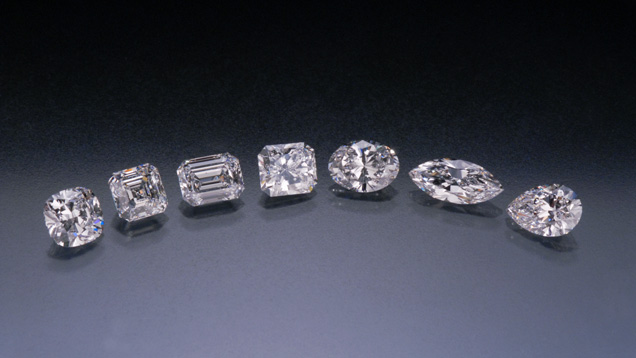
These diamonds feature a range of shapes and cutting styles. From left: cushion cut, Ascher cut, emerald cut,
princess cut, oval shape, marquise shape, pear shape. Courtesy of Lazare Kaplan Diamonds.
Preference in shape may be reflected in other aspects. If she prefers clean, modern lines in furniture, for example, it's likely she'll react well to the same aesthetic in rectangular or square shapes. If she tends towards the traditional, a round shape rarely misses. Are her tastes eclectic or bohemian? She may favor more unusual shapes, like a triangular or marquise shape.
A diamond’s cutting style refers to its facet arrangement, rather than its shape. Round-shaped diamonds, for example, are cut in the brilliant style − an arrangement of 57 or 58 facets designed to maximize the diamond’s sparkle and minimize the appearance of inclusions. The fewer the facets, the more visible any inclusions will be, so a cutting style such as a step cut (a.k.a. emerald cut), for example, requires higher clarity in the diamond.
DECIDE ON A SETTING
Consider her lifestyle and how well a certain setting design will fit into it. If she's more active or outdoorsy, look for lower profile, less ornate or more secure mountings, which are less likely to get knocked against or caught on things. If she's more of a glamour girl, look for statement settings, with a higher stone profile, more intricate ring detailing or a unique motif.
While there are endless design choices you can make for her ring, there are some basic setting types you are likely to encounter:
SOLITAIRE
A single stone and still the most popular style choice in engagement rings. If prong set, the head secures the diamond and the prongs allow the diamond to catch the most light. A six-prong setting is more secure than four prongs. A bezel setting is even more secure and protects the girdle of the stone, but allows the diamond to catch less light than a prong setting.
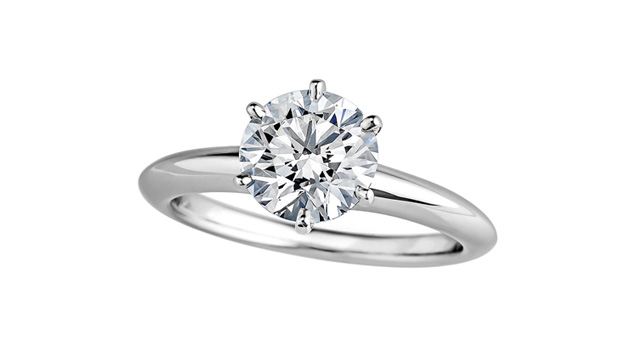
SIDESTONE
Smaller diamonds or other gemstones that flank the larger center stone for additional sparkle or color. Popular sidestone settings include prong, channel (which protects stones by keeping them flush), and bar-channel (which allows more light to enter the sidestones).
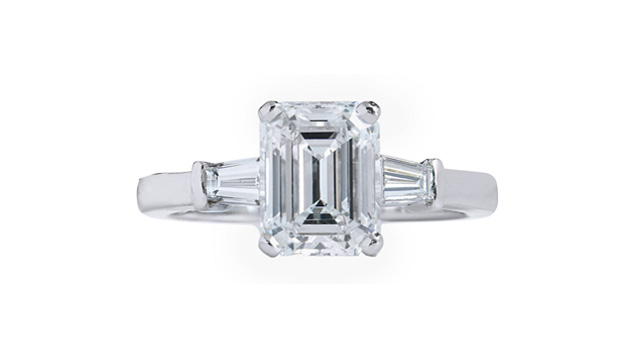
Courtesy of 1stdibs.com
THREE STONE
Typically, the diamonds are the same shape with the center diamond larger than the two sidestones.
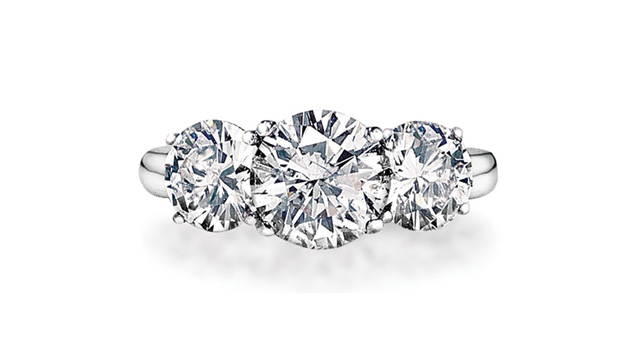
HALO SETTING
The center stone is surrounded by tiny gemstones in a pave (pah-vey) setting, usually diamonds, to add sparkle and to give the appearance of a larger center stone.
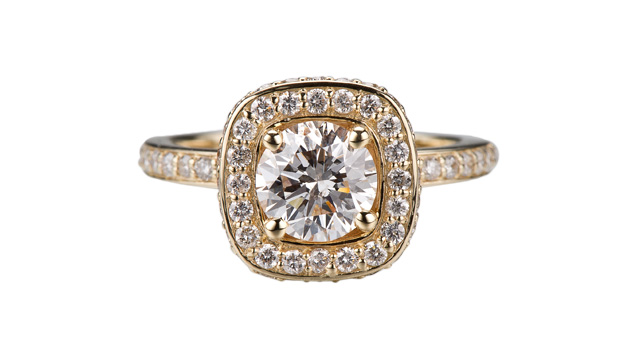
Designed by Michael Russo.
DECIDE ON A METAL
A diamond engagement ring is meant to last a lifetime so it is often made of gold or platinum - highly durable metals that can withstand many decades of daily wear. Metal color is a matter of personal preference with gold providing more color options: white, yellow or rose. Metal color is also a consideration since the appearance of a diamond’s color is affected by its surroundings. Once you’ve selected your diamond, ask your jeweler to show you how it would look with different colored metals.
FIND A JEWELER
You don’t have to go it alone. A good jeweler will ensure that your engagement ring buying process is stress-free. He or she will educate you about the 4Cs of diamond quality, answer your questions in detail, and help you narrow your choices to those that fit your intended’s tastes and your budget. Look for a jeweler with professional training and a good reputation – asking friends or relatives for recommendations or seeking a referral from a jewelry association is a good place to start. Learn about the store’s return policy. And be sure to ask for an independent grading report, like those provided by GIA, prior to purchasing a diamond to validate the quality of your purchase. GIA’s Retailer Lookup can help locate a jeweler in your area who carries GIA graded diamonds and has GIA trained associates on staff.
Buying an engagement ring can be easier than you think, if you educate yourself about diamonds and the 4Cs, know her tastes and find a good jeweler to work with. Enjoy the process and imagine the look of awe, surprise and love you’ll get when you put that perfect ring on her finger!
If you’re wondering why you’re buying a ring in the first place, check out our timeline that charts the long history of the engagement ring.

